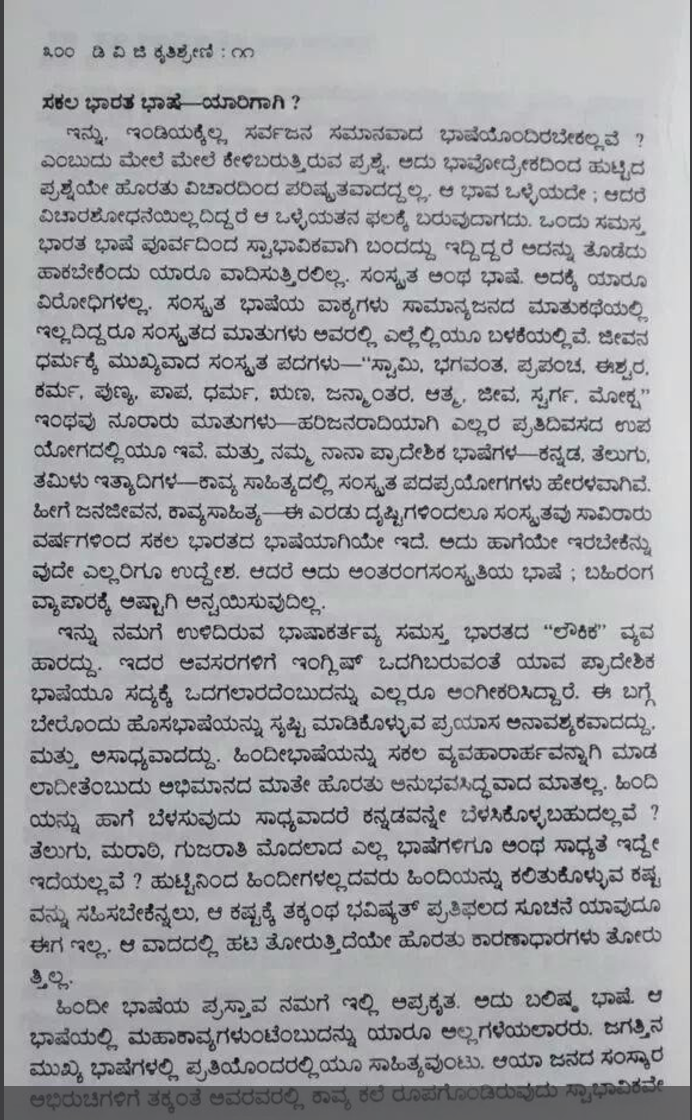On Hindi-fication of India
Swami Gulagulaananda said:
“I wonder how many things, among the ones that we say out loud vehemently, we truly believe in"
A couple of days ago, a pro-Kannada activist group smeared paint over all Hindi sign-boards of all Bangalore Metro stations. They also insisted that Hindi messages should be eliminated from the Metro Trains. As of now, the announcements in Bangalore Metro trains are in three languages - Kannada, English and Hindi.
Why do they have a problem with Hindi? The pro-Kannada supporters don’t hate Hindi - They oppose the choice of Hindi. They question “Why Hindi specifically? Why not Telugu or Tamil?” They feel that Hindi is being thrust on the locals. It would make sense, perhaps, if the Hindi population is large enough to warrant Hindi. However, it appears that the Telugu and Tamil populations outnumber the Hindi populace in Bangalore by a significant number.
Ah, but isn’t Hindi the national language of India? It turns out that India has no official national language and all languages are to be treated equally.
When I look at India as a country, I prefer comparing India to the European Union rather than China or the USA. While China is mostly homogeneous, a lot of people feel that the USA is rather heterogeneous, what with the melting pot and all that rot. The USA may have a large population of mixed races of people from various countries, but in the end, they speak a common tongue - English. Even outsiders, Indians included, speak in English in the US. Perhaps California is an outlier, considering the large population of Hispanics there. California has signboards in English and Spanish. But the rest of the US is rather homogeneous in this regard.
European Union on the other hand is comparable to India where each country of the EU is like a state of India. They've various languages like English, French, German, Italian and others just like India’s Hindi, Kannada, Tamil, Telugu, etc. Their cuisines vary across countries, just like Indian cuisines vary across states. In fact, North Karnataka cuisine is a lot different from South Karnataka...
Given these many differences, it is truly amazing that India is still one single country - It’s indeed a sub-continent. It’s fantastic that we all work well with one another despite our differences.
Ideally speaking, we should cherish these differences and continue living as one. However, differences prevent us from truly being one. In reality, people like to bond over things that they have in common. Differences make the world colourful, but people generally don’t like changes and differences. People like to bond with similar people. If you are a hardcore nerd who likes to read, you are less likely to hang out with jocks who like to play football. You would rather discuss the next best book to read with a fellow nerd. This is the way we are.
So despite all the ideal talk about unity in diversity, people bond with similar people better. That doesn’t mean that a Hindu and Muslim, a North Indian and a South Indian, etc. cannot be friends. The amalgamation of similar types is better.
When a North Indian and a South Indian have to converse, they end up picking a common language to communicate with each other; and more often than not, that common language ends up being English. Even a Tamilian and a Kannadiga talk in English. Let’s accept the fact that English is the universal global language, and also the language that has given India a signficant edge over China.
Personally, and sometimes I am embarrassed to admit, English happens to be my strongest language. I am pretty sure, though I have never tested myself, that my English vocabulary is several times better than Kannada (local language) or Konkani (my native tongue). I can confidently speak English without any foreign loan words, but end up mixing English words while speaking other languages. That doesn’t mean that I am bad at other languages - I just happen to be better in English.
It is very rare for a Hindi person to speak in Kannada (however broken) in Bangalore. They speak in Hindi or English. The locals, on the other hand, respond in broken Hindi most often. I love Bangalore for this - Try doing this in Tamil Nadu :P
But should we pick English as the common language? Wouldn’t it have been better if we had a common Indian language to talk in?
In my opinion, India needs a common Indian language - and I believe Hindi should be that language. Hindi has the highest number of speakers in India and is most widely spread. While Bengali comes second, Bengali is a very localised language, while Hindi covers a larger geography. Hindi also happens to be the language known by most of us - I am sure that a majority of Indians reading this post are also avid Bollywood fans who can speak passable Hindi. To summarise, more non-native speakers of Hindi know Hindi than non-native speakers of any other language knowing a third language.
I am not, of course, asking for Hindi as a replacement to local languages; neither do I subscribe to pushing it down our throats. But I strongly feel that we as Indians need more unifying - and if a common language can play a role in it, that language, in my opinion, is Hindi.
I am interested to know the opinions of others though - Do you feel that Hindi should be the unifying language? Or should it remain English?
Counter Argument
The following is a counter argument by my friend, Lokesh Acharya. He has quoted famous poet D.V.G.
This is the link to his original tweet.



Comments